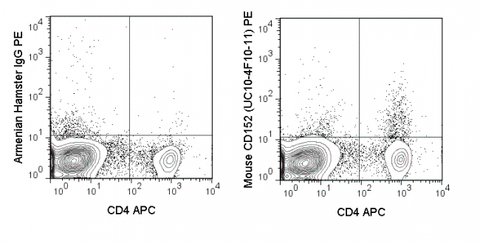
PE Anti-Mouse CD152 (CTLA-4) (UC10-4F10-11)
View Cart or Continue shopping.
Description
The UC10-4F10-11 antibody is specific for mouse CD152, commonly known as CTLA-4, a 33-37 kDa protein expressed as a homodimer on the surface of activated T and B cells, and on thymocytes. CTLA-4 is structurally similar, yet functionally disparate, to the T cell co-stimulatory molecule CD28. Both CTLA-4 and CD28 interact with the co-stimulatory molecules CD80 (B7-1) and CD86 (B7-2) on antigen-presenting cells, with CTLA-4 displaying a higher avidity than CD28. While CD28 typically delivers a potent co-stimulatory signal in support of T cell activation, CTLA-4 appears to act as a negative regulator of T cell activation and may contribute to the suppressor function of Treg cells.
CTLA-4 proteins may be initially sequestered within Golgi vesicles, from which they can be rapidly transferred to and from the cell surface, a mechanism by which Treg cells can selectively impart suppressive functions. The UC10-4F10-11 antibody may be used for flow cytometric analysis of CTLA-4 expression.
| Name | PE Anti-Mouse CD152 (CTLA-4) (UC10-4F10-11) |
|---|---|
| Cat. No. | 50-1522 |
| Alternative Names | Cytotoxic T Lymphocyte-Associated Antigen-4 (CTLA-4), Ly-56 |
| Gene ID | 12477 |
| Clone | UC10-4F10-11 |
| Isotype | Armenian Hamster IgG |
| Reactivity | Mouse |
| Format | PE |
| Application | Flow Cytometry |
